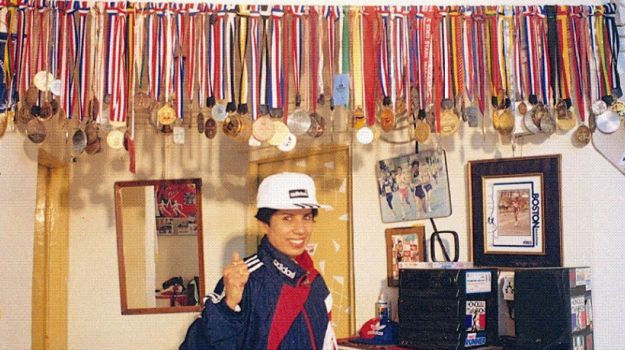Coss Marte was released from prison in March 2013 after serving time for dealing drugs. Four years later, he’s the proud owner of ConBody, a trendy “prison-style boot camp,” and has trained the likes of “Avatar’s” Stephen Lang and “Seinfeld’s” Larry David.
Marte tells CNBC Make It that he has been able to create one of the most in-demand fitness studios by doing this: constantly pitching himself.
Marte says he was making over $2 million selling drugs from age 19 to 23 when he was arrested. While in prison, doctors told him he was overweight and that his cholesterol was so bad he only had five years to live. Determined to not die in the cell, Marte started working out and lost 70 pounds in six months.
The businessman, now 31, says his first paying customer after his release was his mother. Every day he would head to a public park at 5:30 a.m. to exercise. From there, he began training people who he came across in the park. He would hand out business cards to passerby on the street and approach girls in yoga pants to offer his training services.
“I never stopped pitching myself,” Marte tells CNBC Make It. “I’d tell my story 20, 30 times a day. I’d go on the train and talk about what I do and act a fool. Whatever it took.”
As his client list started to expand, Marte began renting out rooms and by 2014 his classes had begun to outgrow the spaces he was renting.
Obstacles along the way
The fitness trainer decided it was time to find a permanent location for ConBody but real estate agents had a different idea. Marte tells CNBC Make It that nobody wanted to let him rent a studio because he had been formerly incarcerated.
“We’d start talking to them … and they’d be really into it,” says Marte. “Then we’d tell them that it was former prisoners and about the concept. All of a sudden you’d see their body language change and they’d say we weren’t the right fit.”
Marte says he wasn’t ready to give up. After months of looking for places and being rejected by almost 20 real estate agents, a friend of Marte’s notified him that a studio was available for rent. The space was located on Broome Street, ironically, in the exact same area that he used to sell marijuana and cocaine.
The ConBody founder says he knew immediately that it was the perfect location for his business. On November 2015, he signed the lease and ConBody opened for business in January 2016. But unbeknownst to him, things were just getting interesting.
ConBody gets a lucrative partnership
In 2016, Marte attended a wellness conference at Spring Studios in Tribeca, as a keynote speaker. After telling his story about his transformation from ex-con to business owner, he was approached by Misha Vayner, manager of leased departments at luxury department store Saks 5th Avenue.
Vayner told Marte that she wanted him to be a part of Saks’ new wellness center, called The Wellery, and the two exchanged information.
“I honestly forgot about it,” says Marte. Two months later, he was contacted by Saks and asked if he would partner with them as soon as possible. Marte enthusiastically agreed and two weeks later he had built a ConBody location on the second floor of the Saks in Midtown.
How ConBody helps former inmates
The fitness trainer says he had many doubters as he built his business. “People thought I was crazy,” says Marte. “I’d ask friends to join me and they’d question it. Now those same people want to be a part of it.” And understandably so.
The business has grown quickly within the last year and a half. ConBody started with just Marte’s mother and a few friends as clients. Now, about 15,000 people use ConBody, across all platforms and locations. Prices for classes range from $20 for first-time clients to $250 for a package of 10 classes. A one-on-one session with Marte will run you $150 per hour.
The company recently launched ConBody Live, which features online training videos for at-home workouts, and the membership is growing quickly, says Marte. The number of instructors has grown from four to ten and ConBody hosts about 34 classes a week. Marte says most of the instructors are former inmates, which is really important to him.
“Money doesn’t matter to me. What’s really important is impacting people’s lives,” he tells CNBC Make It.










